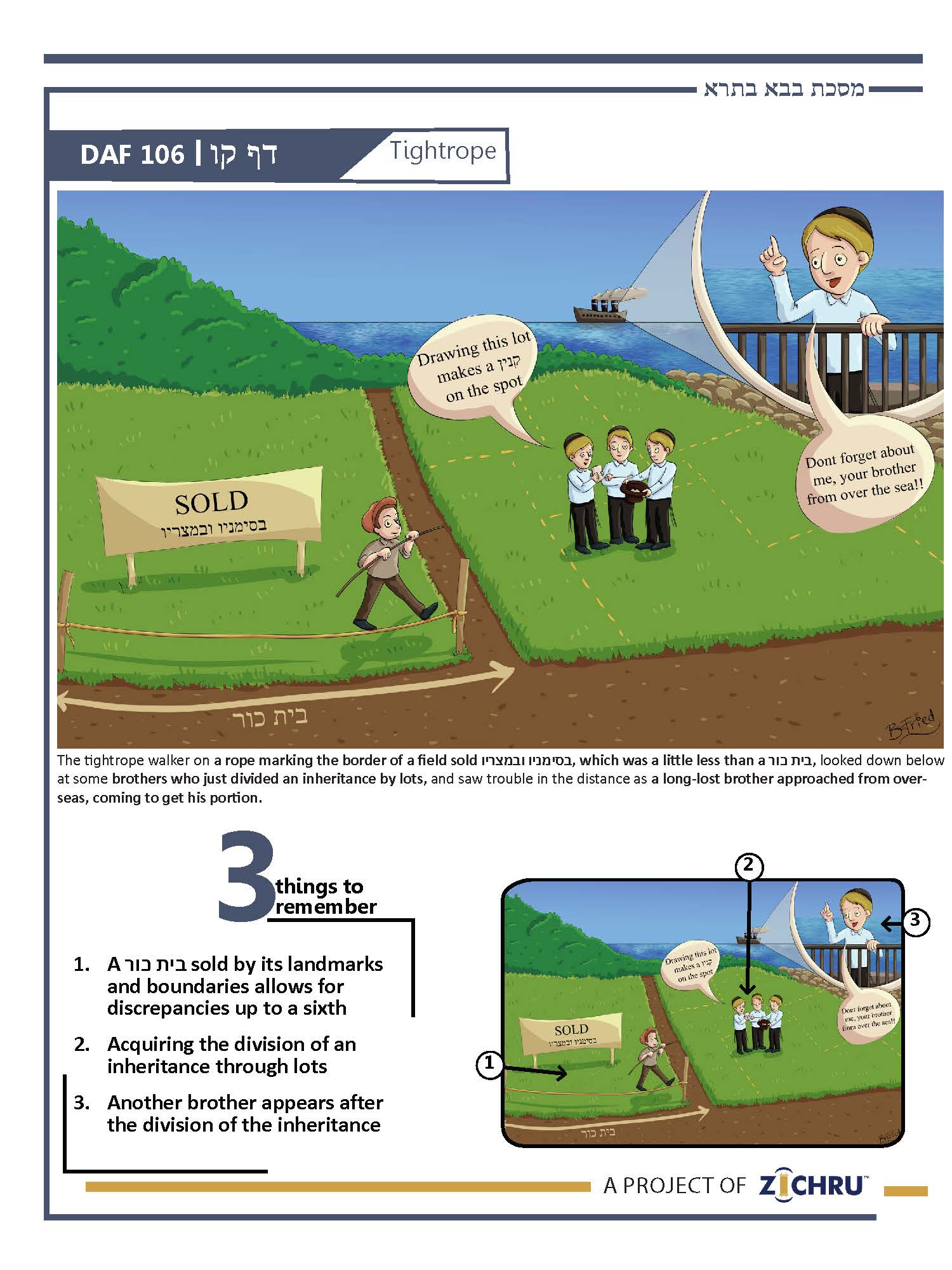Bava Basra - Daf 106
- Audio Timestamps
0:00 - The 3 Sugyos
3:02 - Review of 3 Sugyos
5:52 - Siman
8:41 - 4 Blatt Back Chazarah
14:48 - Pop Quiz (Last 7 blatt)
For access to all Zichru resources including PDFs, and illustrations CLICK HERE
- A בית כור sold by its landmarks and boundaries allows for discrepancies up to a sixth
The next Mishnah states: בסימניו ובמצריו – If someone sold a beis kor and identified it by its landmarks and boundaries, but it was discovered that the field did not contain a beis kor, פחות שתות הגיעו – then if [the discrepancy] was less a sixth, it becomes [the buyer’s] as is, without compensation. עד שתות ינכה – But if the discrepancy is greater, down to a sixth, he must deduct from the purchase price according to the discrepancy. This is four times the rate given in the case of "הן חסר הן יתר", which allows for a quarter-kav per סאה. The Rashbam explains, since even without mentioning the landmarks and boundaries, there is an allowance for a discrepancy a quarter-kav per סאה, this additional language (which implies the field is sold “as is”) increases the allowance to a sixth. Amoraim discuss a discrepancy of exactly a sixth. Rav Huna says: שתות כפחות משתות – a sixth is like less than a sixth, and no adjustment is made. Rav Yehudah says: שתות כיותר משתות – a sixth is like more than a sixth, and it is deducted from the price. The Gemara proceeds to explain how each Amora reads the Mishnah.
- Acquiring the division of an inheritance through lots
In a Baraisa, Rebbe Yose said: האחין שחלקו – brothers who divided an inheritance and agreed to use lots to determine who receives which portion, כיון שעלה גורל לאחד מהן – once a lot is drawn for one of them, identifying his portion, קנו כולם – they all acquire their share of the inheritance. The one whose lot was drawn acquires his portion, and the others acquire the remaining estate between them. Rebbe Elazar explains: כתחלת ארץ ישראל – it is like the initial division of Eretz Yisroel. Just as that division was effected through lots, heirs can also divide an inheritance through lots. The Gemara asks, however, that if this law is derived from the original division of Eretz Yisroel, the lottery should require בקלפי – drawing the lots from a box, and the אורים ותומים, similar to the division of Eretz Yisroel!?
Rav Ashi answers: בההוא הנאה דקא צייתי להדדי – in exchange for the benefit received that they consent to each other to divide the estate, גמרי ומקנו להדדי – they fully agree to transfer the shares to each other.
- A third brother appears after the division of the inheritance
The Gemara discusses two brothers who divided an inheritance, ובא להן אח ממדינת הים – and another brother came from overseas and claimed a share, Rav says: בטלה מחלוקת – the first division is void, and the estate must be redivided. Shmuel says: מקמצין – they each take off a third of their share and give it to the third brother, but the original division remains in effect. Rava asked Rav Nachman, that Rav apparently holds הדר דינא – a judgement is reversed if one party was not present for the division. If so, then if two of three partners divide a partnership into three shares without the third partner’s knowledge, the division should not be effective, and it certainly is!? Rav Nachman answered that in that case, נחיתי אדעתא דבי תלתא מעיקרא – they originally went to divide the partnership with all three parties
in mind, so the division is valid; in Rav’s case, the estate was divided into two, not three. Shmuel holds קם דינא – the judgement stands, although the division was made without accounting for the third brother.
Siman – Tightrope walker on a thin line (קו)
The tightrope walker on a rope marking the border of a field sold בסימניו ובמצריו, which was a little less than a בית כור, looked down below at some brothers who just divided an inheritance by lots, and saw trouble in the distance as a long-lost brother approached from overseas, coming to get his portion.


